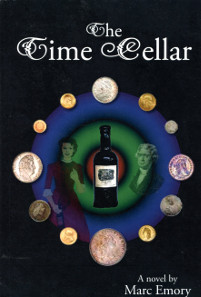by Ursula Kampmann
translated by Annika Backe
February 5, 2015 – He doesn’t seem extraordinary at all, this novel’s hero: Robert H. Packard, as in Hewlett-Packard but without the money, born in 1971, unhappily (still) married, wine aficionado without the means to acquire the really expensive splendid wines, yet full of dreams about his beloved France. One day, two windows open up for this Packard in the cellar, two windows that seemed to have been waiting just for him. The one leads to the French village of Pauillac in 1860, the other leads to Monticello and 1818.
Marc Emory, The Time Cellar. Ivy Press, Inc. Dallas 2012. 334 p. 15 x 22 cm. ISBN 978-1-59967-971-6.
He who loves fine red wine, just like the hero of this story, immediately gets what this is all about. After all, not far from Pauillac the Château Mouton-Rothschild is located which even teetotalers nowadays know. Banker Nathaniel de Rothschild had bought it in 1853 and spent a great deal of money on improving the wine’s quality. Wines from such distant a past with such illustrious names obtain record prices at modern auctions.
Then there is Monticello; known to every American as the home of Thomas Jefferson. Yet this is probably known to only a small minority of wine collectors: Jefferson too was a keen wine drinker. On his trip to France he had bought many bottles of Bordeaux, had marked them with his initials Th. J. and shipped them to the New World.
Thanks to these two windows, our Robert H. Packard gets his hands on some of the world’s most expensive wines – and he knows how the market works, hence he sells his bottles with enormous profit. What sounds like an ideal situation turns out to be a rather unpleasant experience. For one thing, there is the middleman on Rodeo Drive at Beverley Hills who would love to do business with Packard’s “source” directly. For another thing, there is the IRS – to the non-American: the equivalent to our tax authorities. It is obvious that the state wants to know where Packard’s additional income comes from. The lawyer of the wife should not go unmentioned, who intends to grab the biggest possible share of this fortune. In short, the life our Robert is leading doesn’t get any happier with what he gets out of his wine business.
Of course, the story has a happy ending, a clever solution of the well-constructed plot. This is as fascinating to read as the entire book. Author Marc Emory is known to his colleagues as a linguistic genius. He speaks French as fluently as he can express himself in Catalan and Hungarian. His sense of language turns this book into a work of art whose easy-to-read, short sentences come up with any number of unexpected punchlines. It is a firework of linguistic jokes and a wonderful view from an (alleged) outsider’s perspective onto our cherished world of coins we can’t do without.
You see, anyone who intends to buy wine in the past needs the proper coins. Robert gets these from a coin dealer called Josh Crane. Like any coin dealer, he is helpful, open to the most unusual customer requirements and always ready to explain the mysteries of the numismatic secret code.
So it is a real pleasure reading this novel and watching the worlds clashing. Marc Emory writes as one who moves between the cultures himself and carefully studies those around him. His figures are convincing and have made many readers’ day already. From science fiction fans on Amazon he received virtual rave reviews which I would like to fully subscribe to!
You can buy the book on Amazon or on other websites.





